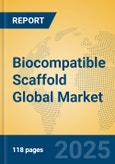Market Size: The global biocompatible scaffold market was valued at approximately USD 1.2 billion in 2023 and is anticipated to reach around USD 2.5 billion by 2029, growing at a compound annual growth rate (CAGR) of about 12.5%. Such substantial growth can be attributed to the increasing prevalence of conditions requiring reconstructive surgeries and the rising focus on personalized medicine. The ongoing research and innovations across the pharmaceutical and biotechnology sectors are further driving the demand for advanced scaffolding materials.
Market Share & Trends Analysis: The biocompatible scaffold market is characterized by a diverse range of product types, applications, and end-users. Heres a breakdown by product type:
- Nanofiber Scaffolds: This segment is expected to hold a market share of approximately 30% due to their high surface-to-volume ratio, which enhances cell-matrix interactions.
- Hydrogel Scaffolds: Hydrogel scaffolds comprise around 25% of the market and are favored for their excellent biocompatibility and ability to maintain a moist environment.
- Composite Scaffolds: These account for 20% of the market due to their tunable physical properties and bioactivity, allowing for customization based on specific tissue engineering needs.
- Others (including Natural and Synthetic Scaffolds): This category represents the remaining 25%, which includes collagen-based and poly-caprolactone (PCL) scaffolds.
- Pediatric Atresia & Esophageal Disease: This application is increasingly prominent, especially with rising cases in pediatric populations, capturing a market share of 15%.
- Non-Small Cell Lung Cancer: The scaffolds are utilized in growing cancer-related tissues for research and treatment options, contributing about 20% share in the current market.
- Tracheal Disease and Trauma: With rising trauma cases, this application is responsible for approximately 25% of the market.
- Others: This category includes various applications accounting for around 40%, such as orthopedic and dental procedures.
- Aldagen
- Asterias Biotherapeutics
- Athersys
- BioTime
- Caladrius Biosciences
- Cytori Therapeutics
- DuPont
- InVivo Therapeutics
- Mesoblast
- Miramatrix Medical
- Nanofiber Solutions
- Neuralstem
- Orgagen
- Organovo
- Osiris Therapeutics
- Pluristem
- Smiths Medical
- Tissue Genesis Inc.
- Tissue Growth Technologies
- United Therapeutics
- Vericel Corporation
- W.L. Gore and Associates
- Biostage
Key strategic partnerships, mergers, and acquisitions among manufacturers have also facilitated technological advancements and market expansion. For instance, recent collaborations between research institutions and biotech firms aim to harness the potential of 3D bioprinting to produce patient-specific scaffolds. Such developments are likely to enhance the customization capabilities of scaffolds, subsequently increasing their adoption in various clinical applications.
Segment Forecasts, 2024 - 2029: The biocompatible scaffold market is projected to experience robust growth across all major segments over the forecast period. The following trends are anticipated:
- Geographic Expansion: The Asia-Pacific region is expected to exhibit the fastest growth, with a projected CAGR of around 15%, owing to rising investments in healthcare infrastructure and innovation in biocompatible materials.
- Technological Advancements: Innovations in scaffold materials, such as the development of bio-resorbable and bioactive polymers, are expected to enhance scaffold performance and application scopes.
- Increased Investment in Research: Government and private organizations are anticipated to increase funding for research in regenerative medicine, significantly contributing to market growth.
This product will be delivered within 1-3 business days.
Table of Contents
Companies Mentioned
- Aldagen
- Asterias Biotherapeutics
- Athersys
- BioTime
- Caladrius Biosciences
- Cytori Therapeutics
- DuPont
- InVivo Therapeutics
- Mesoblast
- Miramatrix Medical
- Nanofiber Solutions
- Neuralstem
- Orgagen
- Organovo
- Osiris Therapeutics
- Pluristem
- Smiths Medical
- Tissue Genesis Inc.
- Tissue Growth Technologies
- United Therapeutics
- Vericel Corporation
- W.L. Gore and Associates
- Biostage








